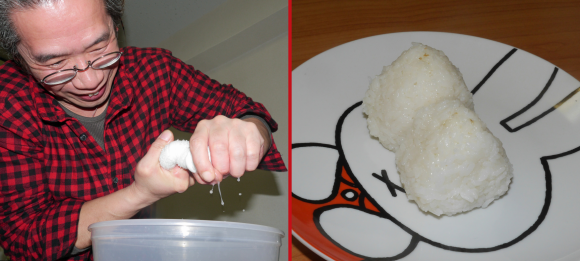
In Japan, rice balls can be flavored with almost anything, so we decided to make some from the most exclusive seasoning of all: salt made from Mr. Sato’s sweat!
If you want to, you can get pretty fancy when making rice balls, called musubi or onigiri in Japanese. Gourmet ingredient choices include unagi (freshwater eel) or ikura (salmon roe), both widely considered delicacies in Japan.
On the other end of the spectrum, though, you’ll find more pedestrian fillings such as salmon or bonito flakes. The most basic rice balls of all, though, are shio musubi, which are just rice balls with a dash of salt.
Simple as they may be, shio musubi can actually be quite refreshing and tasty, especially when made with high-end salt. So in taking the local food movement to its ultimate extreme, we made our own salt, sourced from the sweat of RocketNews24’s intrepid Japanese-language reporter Mr. Sato.
Step one, of course, was to obtain a sufficiently sized sweat Sato sweat sample. While we could have just cranked up the heat in the office, we instead sent Mr. Sato over to Shinjuku’s Kabukicho, one of Tokyo’s largest bar districts which, like all night life centers in Japan, has a number of saunas. After stripping off his clothes, our reporter spent 10 minutes sitting in the sauna, wiping himself off with a towel as he sweat away. He then stepped out for a two-minute rest before going back in for another 10-minute stint, eventually doing six cycles and thus spending a cumulative hour in the sauna.
He then stuck the towel he’d been using the whole time in a Ziploc bag, brought it back to the office, and wrung it out into a bowl.
Having never made salt from human sweat before, we weren’t entirely sure if we had enough raw material to work with, but we poured what we had into a frying pan, then switched on the burner to cook off the moisture.
The liquid soon began to bubble, and before long it evaporated, leaving behind a pale powder that had to be salt! Well, we suppose there’s also the chance that there were some granular dirt and other random particles mixed in, but setting aside purity levels, we now had a batch of Sato-sourced sodium.
After waiting for the pan to cool down, but before making the rice balls themselves, Mr. Sato decided to try his signature seasoning. Since it came from him, it must be perfectly suited to his palate’s natural preferences, right?
So he put a little on his fingertip…
…took a lick…
…and found out that it had an even stronger salty taste than he’d expected! Mr. Sato described the effect as “condensed salt,” with a concentrated effect similar to condensed milk.
Oh, and it also stank like a sweaty Mr. Sato, which maybe we should have expected.
But of course, some seasonings only reveal their true deliciousness when they’re used to accent the taste of other foods. So the next order of business was to scrape the salt out of the pan.
▼ It was only then that we realized that Sato Salt isn’t white, but a troubling yellow in color.
Then, Mr. Sato got to work shaping two rice balls, which was really the only part of this day in the kitchen that wasn’t gross.
Once that was done, Mr. Sato took a pinch of Sato Salt and sprinkled it across the top of his two triangles of rice.
Then, it was time for the moment of truth.
And the truth was terrible.
For a brief split-second of the first bite, the Sato Salt shio musubi tasted like an ordinary salt-seasoned rice ball. The salty tones are punishingly strong, though, and then there’s the smell, and taste, of sweat. And no, you don’t get used to it as the meal goes on. In fact, the more you eat,the harder it becomes to block out the fact that you’re eating crystalized perspiration.
Just to make sure Mr. Sato’s negative reaction wasn’t the result of some subconscious self-preservation mechanism that prevents people from thinking their own body would taste good, Seiji, the bravest of our Japanese-language reporters in the office that day, also agreed to try a lick of Sato Salt in a taste test we recorded.
So in conclusion, yes, you can make salt from your sweat, and yes, you can use it to season musubi. That doesn’t mean you should, though, even if you’re Mr. Sato.
Images: ©RocketNews24
[ Read in Japanese ]


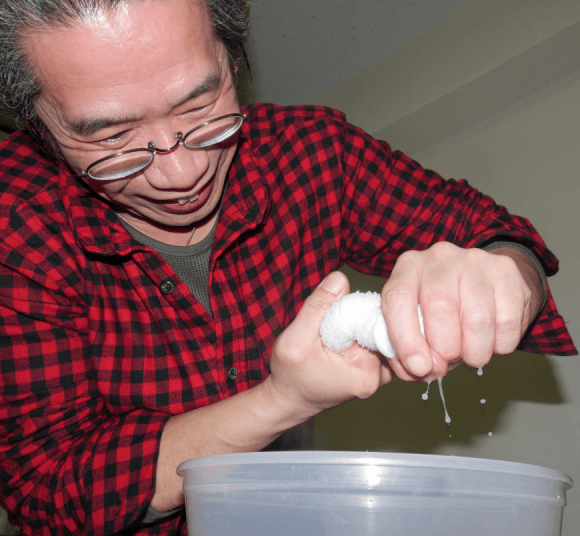
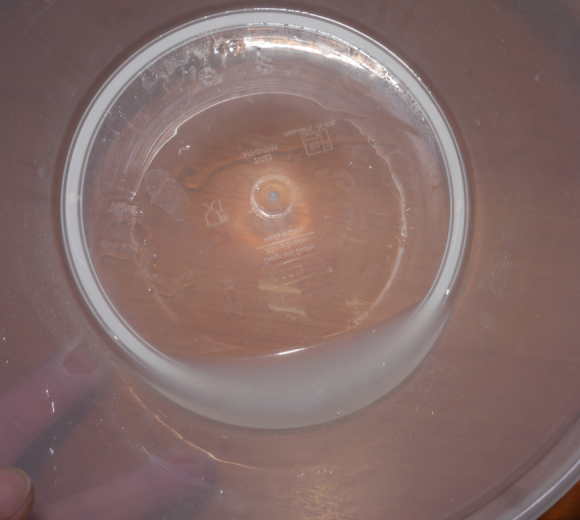
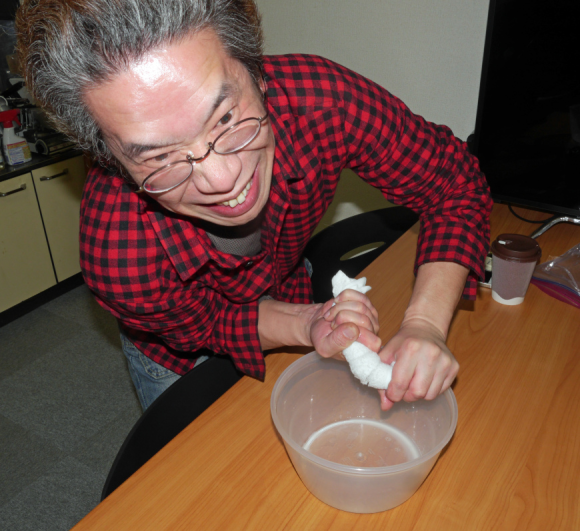
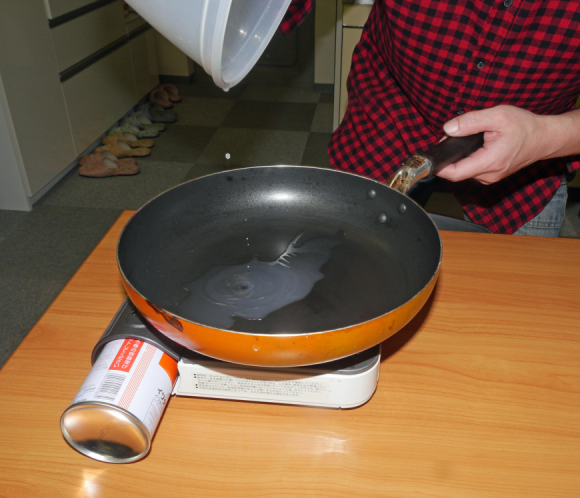
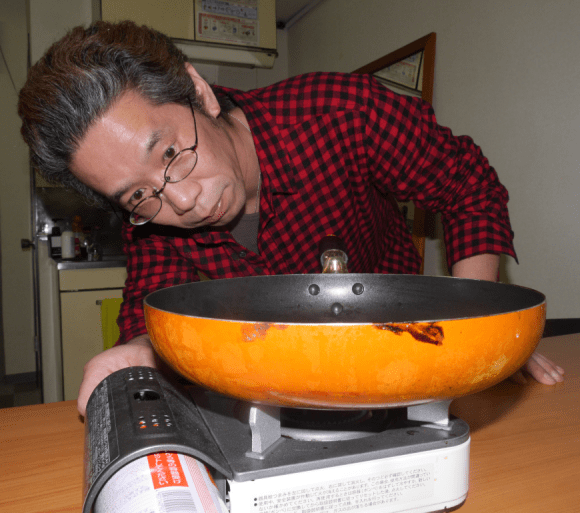
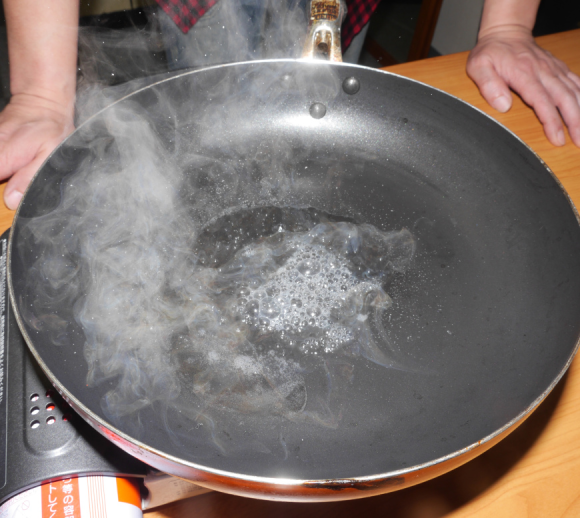
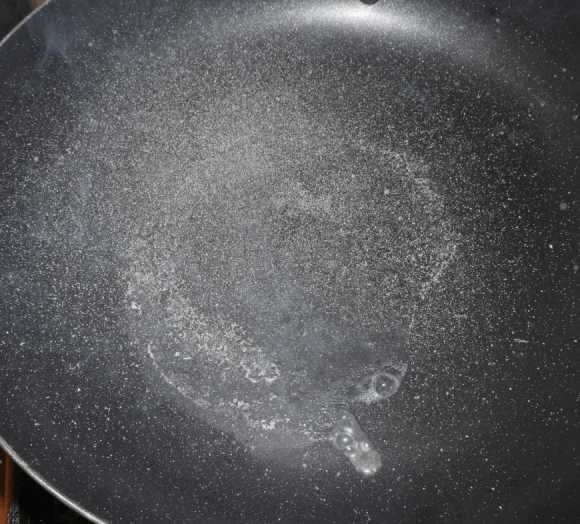
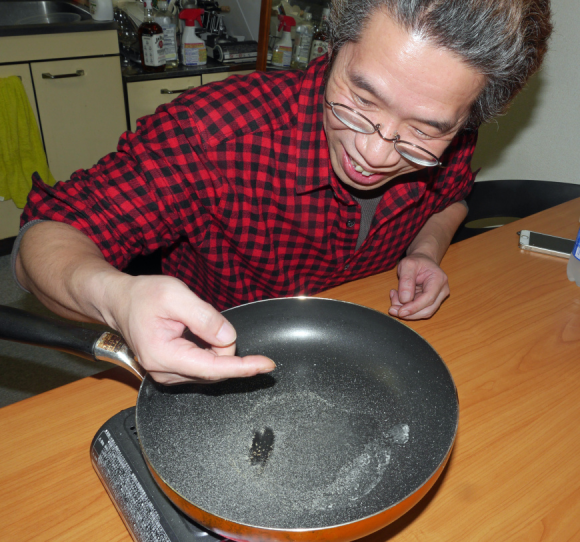



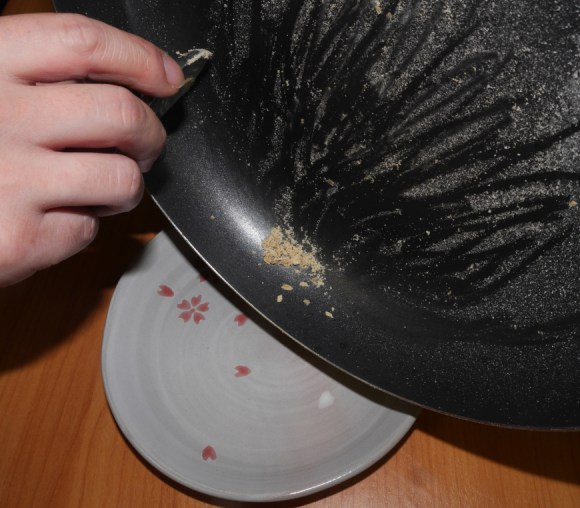
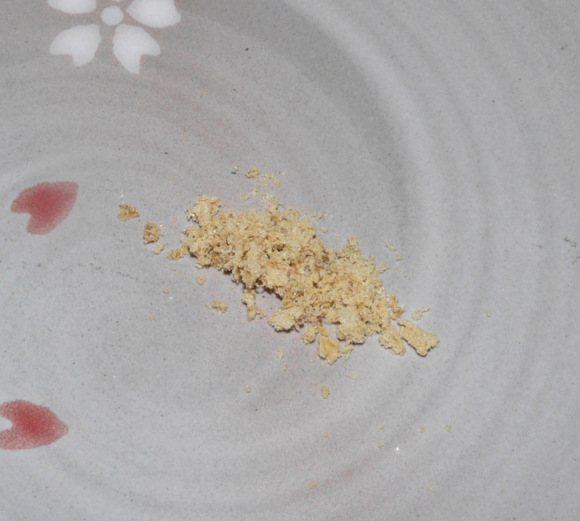
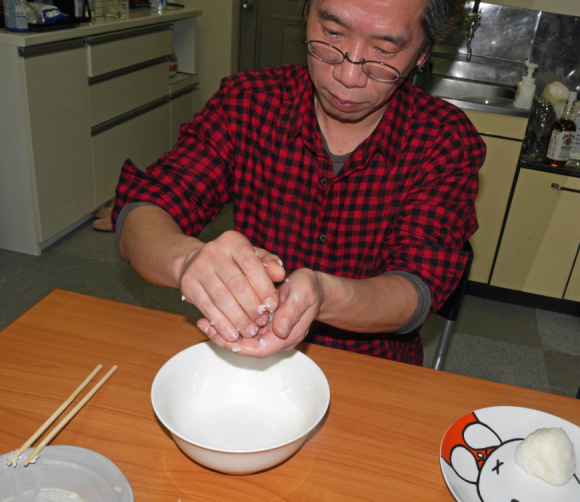

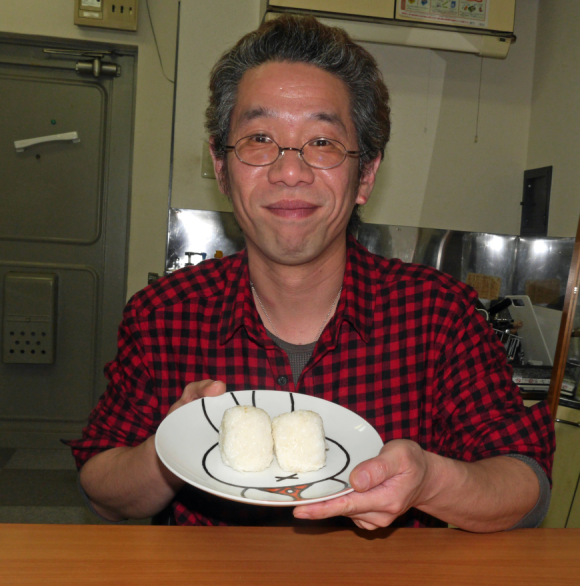
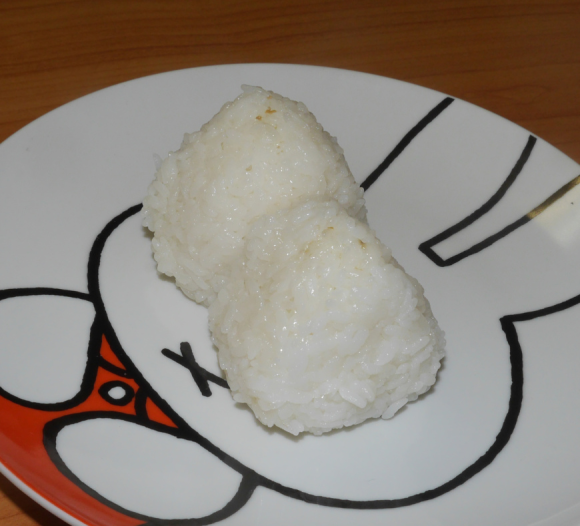

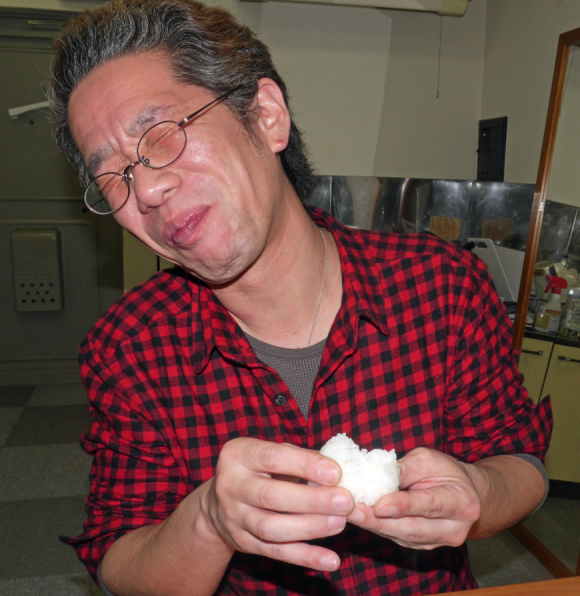



 Around Japan in 47 rice balls: Mr. Sato buys each prefecture’s musubi all from one Tokyo shop
Around Japan in 47 rice balls: Mr. Sato buys each prefecture’s musubi all from one Tokyo shop Japanese convenience store’s newest rice ball filling: Nothing at all, and why we’re OK with that
Japanese convenience store’s newest rice ball filling: Nothing at all, and why we’re OK with that The world’s most famous sushi restaurant sells seaweed too, so we made nori rice balls with it
The world’s most famous sushi restaurant sells seaweed too, so we made nori rice balls with it Watermelon-looking rice balls go on sale in Tokyo, bring Mr. Sato bitter memories of regret
Watermelon-looking rice balls go on sale in Tokyo, bring Mr. Sato bitter memories of regret Rice balls aplenty at the Ministop senbero, but with a special twist【Japan’s Best Home Senbero】
Rice balls aplenty at the Ministop senbero, but with a special twist【Japan’s Best Home Senbero】 Family Mart ups its convenience store food game with special burger from beef bowl chain Matsuya
Family Mart ups its convenience store food game with special burger from beef bowl chain Matsuya Potama serves up epic rice balls like no other, and there’s only one store in Tokyo
Potama serves up epic rice balls like no other, and there’s only one store in Tokyo Tokyo street sweets: The must-snack treats of Nakano’s Refutei
Tokyo street sweets: The must-snack treats of Nakano’s Refutei Starbucks Japan releases first-ever Hinamatsuri Girls’ Day Frappuccino
Starbucks Japan releases first-ever Hinamatsuri Girls’ Day Frappuccino The fish in rural Fukui that rivals Japan’s most auspicious sea bream
The fish in rural Fukui that rivals Japan’s most auspicious sea bream Haunted hospital near Mt Fuji re-opens after renovation at Fuji-Q Highland, and it’s terrifying
Haunted hospital near Mt Fuji re-opens after renovation at Fuji-Q Highland, and it’s terrifying McDonald’s ad in Japan causes controversy overseas
McDonald’s ad in Japan causes controversy overseas Naruto and Converse team up for new line of shinobi sneakers[Photos]
Naruto and Converse team up for new line of shinobi sneakers[Photos] Site of Japan’s most famous samurai murder is now a Kyoto karaoke joint
Site of Japan’s most famous samurai murder is now a Kyoto karaoke joint Haku is…Chihiro’s dead brother? Studio Ghibli fans blown away by Spirited Away theory
Haku is…Chihiro’s dead brother? Studio Ghibli fans blown away by Spirited Away theory Japanese restaurant chain serves Dragon Ball donuts and Senzu Beans this spring
Japanese restaurant chain serves Dragon Ball donuts and Senzu Beans this spring Highest Starbucks in Japan set to open this spring in the Tokyo sky
Highest Starbucks in Japan set to open this spring in the Tokyo sky Tokyo Skytree turns pink for the cherry blossom season
Tokyo Skytree turns pink for the cherry blossom season Japan Extreme Budget Travel! A trip from Tokyo to Izumo for just 30,000 yen [Part 1]
Japan Extreme Budget Travel! A trip from Tokyo to Izumo for just 30,000 yen [Part 1] Yakuzen ramen restaurant in Tokyo is very different to a yakuza ramen restaurant
Yakuzen ramen restaurant in Tokyo is very different to a yakuza ramen restaurant Japan has only one airport named after a samurai, so let’s check out Kochi Ryoma【Photos】
Japan has only one airport named after a samurai, so let’s check out Kochi Ryoma【Photos】 Japanese drugstore sells onigiri at pre-stupid era prices, but how do they compare to 7-Eleven?
Japanese drugstore sells onigiri at pre-stupid era prices, but how do they compare to 7-Eleven? Japan Extreme Budget Travel! A trip from Tokyo to Izumo for just 30,000 yen [Part 2]
Japan Extreme Budget Travel! A trip from Tokyo to Izumo for just 30,000 yen [Part 2] Adorable Totoro acorn key holders come with a special guest hidden inside[Photos]
Adorable Totoro acorn key holders come with a special guest hidden inside[Photos] Japan’s newest Shinkansen has no seats…or passengers [Video]
Japan’s newest Shinkansen has no seats…or passengers [Video] Starbucks Japan releases new sakura goods and drinkware for cherry blossom season 2026
Starbucks Japan releases new sakura goods and drinkware for cherry blossom season 2026 Foreigners accounting for over 80 percent of off-course skiers needing rescue in Japan’s Hokkaido
Foreigners accounting for over 80 percent of off-course skiers needing rescue in Japan’s Hokkaido Super-salty pizza sends six kids to the hospital in Japan, linguistics blamed
Super-salty pizza sends six kids to the hospital in Japan, linguistics blamed Starbucks Japan unveils new sakura Frappuccino for cherry blossom season 2026
Starbucks Japan unveils new sakura Frappuccino for cherry blossom season 2026 Foreign tourists in Japan will get free Shinkansen tickets to promote regional tourism
Foreign tourists in Japan will get free Shinkansen tickets to promote regional tourism The 10 most annoying things foreign tourists do on Japanese trains, according to locals
The 10 most annoying things foreign tourists do on Japanese trains, according to locals Take a trip to Japan’s Dododo Land, the most irritating place on Earth
Take a trip to Japan’s Dododo Land, the most irritating place on Earth Is China’s don’t-go-to-Japan warning affecting the lines at a popular Tokyo gyukatsu restaurant?
Is China’s don’t-go-to-Japan warning affecting the lines at a popular Tokyo gyukatsu restaurant? Survey asks foreign tourists what bothered them in Japan, more than half gave same answer
Survey asks foreign tourists what bothered them in Japan, more than half gave same answer Japan’s human washing machines will go on sale to general public, demos to be held in Tokyo
Japan’s human washing machines will go on sale to general public, demos to be held in Tokyo Starbucks Japan releases new drinkware and goods for Valentine’s Day
Starbucks Japan releases new drinkware and goods for Valentine’s Day We deeply regret going into this tunnel on our walk in the mountains of Japan
We deeply regret going into this tunnel on our walk in the mountains of Japan Studio Ghibli releases Kodama forest spirits from Princess Mononoke to light up your home
Studio Ghibli releases Kodama forest spirits from Princess Mononoke to light up your home Major Japanese hotel chain says reservations via overseas booking sites may not be valid
Major Japanese hotel chain says reservations via overseas booking sites may not be valid Put sesame oil in your coffee? Japanese maker says it’s the best way to start your day【Taste test】
Put sesame oil in your coffee? Japanese maker says it’s the best way to start your day【Taste test】 No more using real katana for tourism activities, Japan’s National Police Agency says
No more using real katana for tourism activities, Japan’s National Police Agency says Weiner Onigiri: Japanese convenience store rice ball has a surprise in store for Mr Sato
Weiner Onigiri: Japanese convenience store rice ball has a surprise in store for Mr Sato Which Japanese convenience store has the best salted onigiri rice balls?
Which Japanese convenience store has the best salted onigiri rice balls? What are Japan’s best, and most unique, regional rice balls?
What are Japan’s best, and most unique, regional rice balls? The best-selling rice ball at Family Mart is…SPAM onigiri?
The best-selling rice ball at Family Mart is…SPAM onigiri? The 10 best types of onigiri rice balls to try in Japan【Survey】
The 10 best types of onigiri rice balls to try in Japan【Survey】 Is anime making otaku eat less rice? Government launches Girl Running Late with Rice Ball Project
Is anime making otaku eat less rice? Government launches Girl Running Late with Rice Ball Project Japan Railways recently revealed ramen-style rice balls in its convenience stores
Japan Railways recently revealed ramen-style rice balls in its convenience stores Mr. Sato uses cooling spray on his crotch, learns a valuable lesson
Mr. Sato uses cooling spray on his crotch, learns a valuable lesson 7-Eleven under fire in Japan for mysterious holes in their onigiri rice balls
7-Eleven under fire in Japan for mysterious holes in their onigiri rice balls Which Japanese convenience store has the best plain onigiri rice balls?
Which Japanese convenience store has the best plain onigiri rice balls? My Neighbor Onigiri-kun – Ghibli’s Toshio Suzuki draws character for rice ball salt packaging
My Neighbor Onigiri-kun – Ghibli’s Toshio Suzuki draws character for rice ball salt packaging The surprising semi-secret ingredient in many Japanese convenience store rice balls: oil
The surprising semi-secret ingredient in many Japanese convenience store rice balls: oil Top Japanese instant noodle maker steps up its rice ball game 【Taste test】
Top Japanese instant noodle maker steps up its rice ball game 【Taste test】 Coffee-infused rice for rice balls and curry? Taste-testing a recipe from Japan’s coffee experts
Coffee-infused rice for rice balls and curry? Taste-testing a recipe from Japan’s coffee experts Mr Sato drinks stinky Pond Water Cider from Japan
Mr Sato drinks stinky Pond Water Cider from Japan